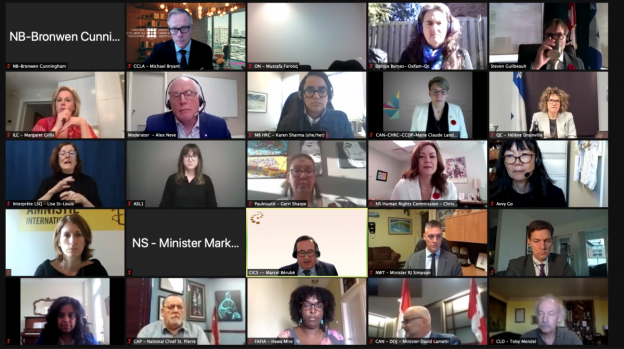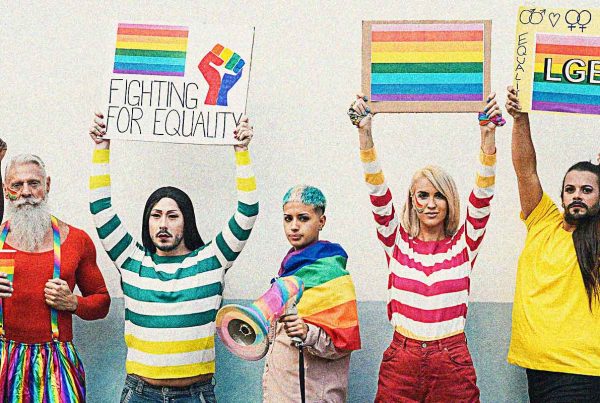November 10, 2020
TO: FEDERAL-PROVINCIAL-TERRITORIAL VIDEOCONFERENCE OF MINISTERS RESPONSIBLE FOR HUMAN RIGHTS,
MEETING WITH CIVIL SOCIETY ORGANIZATIONS AND HUMAN RIGHT COMMISSIONS ON TUESDAY, NOVEMBER 10, 2020, PANEL DISCUSSION: “HUMAN RIGHTS IN CANADA IN CHALLENGING TIMES”
FROM: MICHAEL BRYANT
SUBJECT: CANADIAN CIVIL LIBERTIES ASSOCIATION SUBMISSION TO FPT CONFERENCE
This memorandum sets forth the Canadian Civil Liberties Association’s (CCLA) submissions for FPT Ministers responsible for Human Rights, with particular focus on FPT management of the COVID pandemic. If I have to explain who we are to you, then we are not doing a good enough job in your jurisdiction. Much of our work is done through litigation, in which case we are opposing parties, at times. CCLA has appeared at the Supreme Court of Canada and all levels of court more than any other domestic human rights NGO in Canada, since our genesis in 1964. Our mandate is to change the law where governments or legislatures limit civil liberties contrary to Canada’s Constitution.
We are grateful for the opportunity to participate in this FPT meeting. Our experience over the decades has been that issue-based advocacy through legislative and FPT venues has had less impact than litigation, but we advocate, nonetheless. Earlier this year, CCLA put out a report, grading FPT jurisdictions on their treatment of Canadian human rights during your emergency management of COVID19. We put out another report,last summer, on the enforcement of new COVID rules through charges and tickets. Both reports are being updated as of this writing, with new versions coming out later in November and early 2021.1 Our website also provides regular, sometimes daily updates to human rights issues arising during this pandemic.
Being familiar myself with FPT meetings, and having co-hosted one with the Hon. Irwin Cotler back in the day, I’m mindful of its limitations. Permit me to narrow my focus, therefore, so as to raise but one subject matter (racism), and otherwise focus herein on your systems or infrastructure than on the many critical issues themselves, which are better covered by those aforementioned reports by CCLA. After all, where there are breakdowns in the systems designed to protect Canadian human rights, there is little to no possibility of constitutional compliance. Where that happens, it’s always the vulnerable who suffer the most. We thus have two basic submissions: one about our institutions; the other is practical. I will address the latter at the outset.
RACE-BASED DATA COLLECTION
As often stated by CCLA’s Special Advisor on Anti-Black Racism, Professor Akwasi Owusu-Bempah reminds us that we cannot measure Canada’s performance on human rights without some measures. We need race-based data in Canada, more than ever. While the federal government is making positive strides on this front, in fact it is more important for all FPT jurisdictions to be collecting race based data, in a fashion coordinated at the FPT level or otherwise. It is those jurisdictions that are responsible for the administration of justice, including courts and provincial/territorial human rights codes. It may be that there are costs implications necessitating fiscal federalism considerations, although that need not delay action on this front.
The method of achieving FPT collection of race based data is best left to your expertise as politicians and mandarins adept at the art of the possible. This is a “let’s make it happen” item that is important no matter your view on the state of racism in Canada: if like Quebec’s premier, you are confident that your jurisdiction can demonstrate its constitutional compliance, then you have only to gain from the empirical evidence to prove it. If you share our view on this subject, on the other hand, then measuring progress through data collection will be indispensable to anti-racism policies. It’s time to find out the whole truth about racism in Canada. Pursuing that truth requires race-based data collection by all Canadian jurisdictions.
We realize that a pragmatic impediment to collecting race-based data, in some jurisdictions, is to be found with the judicial branch and its administrative independence. This is a matter requiring your vital attention and expenditure of political capital. Governments ought to enlist NGOs and human rights allies to achieve this goal. If need be, legislative amendments will be urgently needed. The collection of race-based data from coast to coast to coast is a practical accomplishment that will form the foundation of future human rights reforms.
COVID IMPACT ON THE RULE OF LAW IN CANADA
At various times and in various ways, FPT governments have been guilty of attending to the law as an afterthought to their government’s deliberations and then public communications during (often daily) ‘official’ briefings. That those public briefings, by First Minister, Health Minister or chief medical officer, are treated as ‘official,’ belies the problem: in 2020, we’ve gone from a nation too often governed not by laws, as required by our constitution, but by podiums.
The main problem with the diminishment of the rule of law is the disabling of our constitution. The problem with that, in turn, is the removal of the primary human rights shield against governmental overreach. As former SCC Justice and UN Human Rights Commissioner Louise Arbour put it:
In a democracy, the majority has all the tools. It has the votes. It can do what it wants. The whole point of having legal protections for human rights and civil liberties is to use the law to constrain the abuses of the majority.2
The breakdown of legal protections, therefore, removes our only constraint against fear-based emergency management during a pandemic. For example, did a Justice minister determine that mobility rights infringements were demonstrably justified at the time travel bans were decided upon, and implemented? Or did it just happen, after which the litigation response was assembled. Did a Justice ministry insert itself into the discussions regarding P/T quarantine enforcement by warrantless searches of homes, or was that presented to Cabinet as a fait accompli? It is this breakdown of legal protections that will be addressed immediately below.
Canada’s constitutions were designed (i) to divide and limit governmental powers by FPT jurisdiction (Constitution Act, 1867); and (ii) to protect human rights from those governmental powers (Constitution Act, 1982). Both constitutional purposes are being tested during COVID.
Decentralization of emergency management powers has meant that Canadians’ have received different approaches by different FPT governments. These regional differences can be significant, as found by our aforementioned report on enforcing new COVID rules, despite the fact that our human rights are expected to be universal. Besides that regional variation, public confusion arises since what’s true for one province/territory may not be true for another, even if most have access to media covering all jurisdictions. Public consumption of COVID media updates in Canada today is like following NHL scores without team uniforms. Meanwhile, the areas in which the federal government asserted jurisdiction have been limited to international borders and economic recovery; plus the management of a national contact tracing app (COVID Alert). That emergency management of this pandemic was decentralized was inevitable; that FPT coordination has been scarce is not.
As operating systems, as institutions, the three branches of the state in Canada were not designed for a global pandemic. Of particular concern remains that FPT regulations and orders-in-council are not made available to the public in a centralized, timely, accessible manner, in most jurisdictions. Nor do FPT Executive branches alert the public when something said at the podium is already the law (authorized by legs or regs), or amounts to advice or advocacy. Of even greater concern is the extremely limited availability of courts and tribunals to review Executive orders and actions, in some jurisdictions. For several months, too many jurisdictions’ courts were simply closed. Without access to judicial review, citizens (and NGOs) cannot avail themselves of their constitutional protections, to be sure.
Within the FPT Executives, the capacity of Attorneys-General to keep governments within their constitutional limits was spotty, flimsy, and uneven at first, when FPT governments commenced their emergency management of COVID19. One jurisdiction’s initial public health order was signed by a public health official, but it had clearly not been reviewed by counsel, let alone someone from a justice ministry. Rarely, if ever, has the public heard from Justice officials regarding rapidly unfolding rules and their variations. The diminishment of the quasi-judicial function of these ministries, within every FPT jurisdiction, is a severe defect within our constitutional system, at present. The Justice ministries have not so much become partisan or political, as impotent and marginalized. They tend to punt constitutional queries to the line ministries, rather than doing their job as superintendents of the rule of law within their governments.
A solution to the latter could be found in the re-deployment of Justice officials to those ministries particularly engaged in policies and laws limiting peoples’ liberty and freedoms during the pandemic. A further corrective can be found in addressing this matter directly with your First Minister, by ensuring that a Justice ministry voice is present where full Cabinet meetings are not possible. Lastly, Justice ministers themselves ought to expend their political capital at this time to leverage the strongest possible counter-balance to the ongoing public health strategy of mass behavioural modification of Canadian residents. The importance of this voice at this time has never been more pressing in our history, at least since patriation.

About the Canadian Civil Liberties Association
The CCLA is an independent, non-profit organization with supporters from across the country. Founded in 1964, the CCLA is a national human rights organization committed to defending the rights, dignity, safety, and freedoms of all people in Canada.
For the Media
For further comments, please contact us at media@ccla.org.





